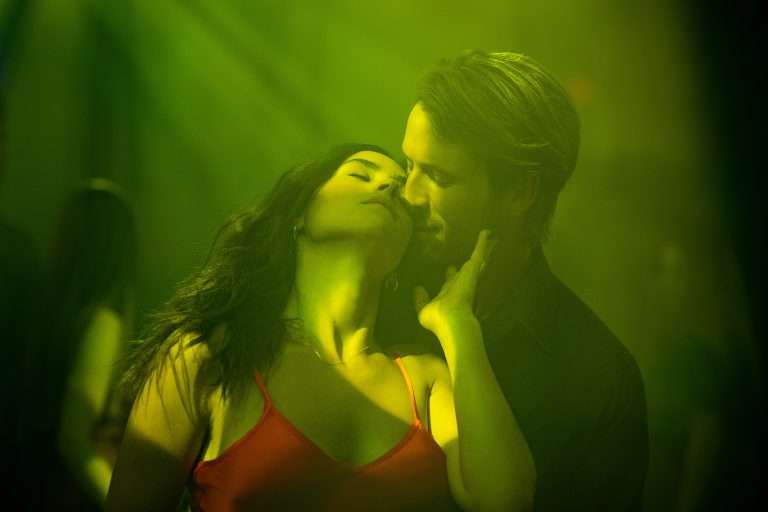South Korean cinema’s post-2000s boom is noted for subversive genre flicks. It’s an era of film that took established tropes and conventions and turned them on their heads to add depth to themes and ideas. While the predictable aspects of a narrative easily immersed the audience, the director and writers twisted those expectations, creating a perfect enriching, and emotional movie experience. Hwang In-ho falls into the same category, choosing to play with the tone of his work as a writer and director. “Monster (2014)” is established in its prologue as an odd duck of a film, as it shifts from a lighthearted, quirky comedy indiscriminately into troubling violence. The writing is economical, establishing a haphazard editing pattern that keeps the viewer on their feet at all times.
We first meet Bok-Soon (Kim Go-eun), a vegetable seller with a developmental disability. She’s fierce, feisty, and considered a psychotic person in her village neighborhood. Bok-Soon lives in her own happy world, often seeing visions of her grandmother in the Sun, having left her with the task of raising her younger sister, Eun-Jeong (Kim Bo-ra). Her world is about to get bigger in ways her innocent mind can never imagine. On the other end of this story is Tae-soo (Lee Min-ki), a psychotic serial killer isolated from the rest of the world. His murderous rage is linked to his horrible childhood under his adoptive stepmother, Kyeong-ja (Kim Boo-seon), and his debt-ridden brother Ik-sang (Kim Roi-ha). Hwang In-ho pens the lead characters’ connection between their isolation in the face of “normal” society and the contrasting relationships with their siblings.
When Eun-Jeong runs afoul of Tae-soo while helping Na-ri (Ah Seo-hyun), a victim on the run, things don’t end well. Bok-soon is lost without her sister, unable to comprehend the violence and drawn to saving Na-ri. Their relationship, too, runs deep, thematically. In a bid to help his brother procure evidence for a high-profile person in business, Tae-soo murders Na-ri’s sister Yeon-hee (Han Da-eun) and comes after her to find said evidence. The writing does exceptionally well to untangle this web of connections, pitting Bok-soon and Na-ri against the cruel forces of Tae-soo, with Ik-sang reluctantly behind him, plotting his own actions. It’s a classic tale of David versus Goliath, balled into a chase thriller and revenge plot. Hwang In-ho’s fascinating treatment makes that marriage of conventional storytelling arcs all the more exciting.
At times, comedy feels insulting to its central characters, especially Bok-soon’s disability. However, the film’s burst of comedic moments and melodrama really enhance the tension when Tae-soo’s disturbing acts come into play. Using humor to undercut the tension works surprisingly well, especially in conjunction with how simple Hwang In-ho keeps the craft of the film. There’s an element of childish fantasy to the quest Bok-soon, and Na-ri go on to attain revenge for their sisters. Though trauma bonded by their past, the duo is too young and naïve to comprehend the dangers ahead, let alone mull in their grief. Things become a touch theatrical, but the writing reins in the emotion. The screenplay charts how wild this journey is, especially for a country bumpkin like Bok-soon as she heads to the city to protect Na-ri from the wrath of Tae-soo.

It clashes well with the tonal shifts not just in writing but also in style when the viewer enters the disturbing world surrounding Tae-soo. His scenes with his estranged family are rife with tension. Color in Bok-soon’s journey goes from bright to slightly muted; for Tae-soo, the color in his scenes is dark and desaturated. The music too, jumps with no continuity between light and touching to distracting and harsh, echoing the psyche of the protagonist versus the antagonist. These disparate styles come clashing together as the protagonist and antagonist finally collide.
Their arcs and psyches merge with the narrative, intelligently woven through craftsmanship. This all helps highlight the film’s core theme: the idea of how unconditional love can be a boon in a selfish world. The tragedy of Tae-soo’s psychotic behavior is connected as much to his nature as it is to his upbringing in a family using him for their own means. Though Hwang In-ho does best to highlight this, he also somewhat falters in the climax in making this message clear.
However, with Bok-soon and her growing bond with Na-ri, the writing is still gentle and tender despite a lack of political correctness. It all ostensibly leads to Bok-soon going off the extreme deep end in a bid for revenge, but still finds heart in her escape into violence. Her condition also means that, much like the jumping tone, her character conveniently brushes past pain and violence to see the brighter side. Living inside her world has its benefits, even when the film’s resolutions become ridiculously easy. With that in mind, Hwang In-ho’s “Monster” isn’t as provocative with the narrative or structure as it is daring in tone. Yet somehow, this adherence to tropes and archetypes works wonders for the film. It all comes down to conviction; even when “Monster” takes odd diversions and reaches ridiculous heights with Bok-soon’s actions, it feels believable and immersive.
Amidst an increasingly cynical viewing public, a plot like “Monster” works because of the belief that the audience will engage with the characters. As outdated as his treatment of Bok-soon is, the empowerment story of her seeking her revenge envelops the viewer. Hwang In-ho understands the need for the public to root for an underdog, and Bok-soon is etched as the perfect one thanks to Kim Go-eun’s endearing performance. Returning from a short-acting hiatus to her sophomore feature film, Go-eun sinks her teeth into the role.
She has fun with the scenes of levity, selling with ease her absurd worldview and explosive demeanor. We understand how deeply her love for her sister sustains her and how that transfers to her concern over Na-ri. It’s invigorating and disheartening to see Bok-soon struggle with the outside world, especially the ruthless city, as she briefly loses her sense of self to take on Tae-soo.
Lee Min-ki as Tae-soo is thus the perfect foil to her, not just in character but also as a performance. When the Police first ask Bok-soon to describe him, she uses the word handsome, which fits perfectly. There’s a disarming charm to Tae-soo despite the emptiness inside of him. Min-ki provides a balancing act, his psychotic tendencies just simmering under the simple shift of an eye and a smile that thankfully doesn’t border on cliché. Both actors understand their assignment and their directors’ intent as their dual narratives come to closure together. In them, Hwang In-ho finds the conduit to highlight how the right kind of nurturing can move past any deficiency and trauma to win over one’s basest nature.

![Doctor Strange In The Multiverse of Madness [2022] Review: One Of The Most Stylistically Distinct MCU Outings In A While](https://79468c92.delivery.rocketcdn.me/wp-content/uploads/2022/05/Doctor-Strange-In-The-Multiverse-of-Madness-Benedit-Cumberbatch-768x322.jpg)
![Geran [2020]: ‘NYAFF’ Review – Gritty action fails to disguise a predictable family drama](https://79468c92.delivery.rocketcdn.me/wp-content/uploads/2020/09/GERAN-Movie-Review-highonfilms-2-768x322.jpg)
![Ten Months [2021]: ‘NYAFF’ Review – The swirling chaos of unplanned pregnancy](https://79468c92.delivery.rocketcdn.me/wp-content/uploads/2021/08/Ten-Months-2-highonfilms-768x432.jpg)
![Udanpirappe [2021] Review – Jyothika’s 50th film is a disappointment from start to finish](https://79468c92.delivery.rocketcdn.me/wp-content/uploads/2021/10/Udanpirappe-Movie-Review-768x512.jpg)

